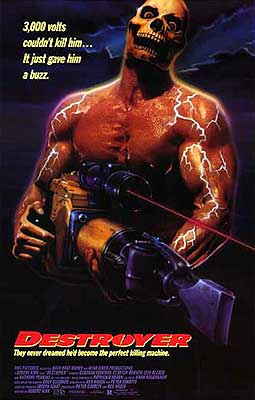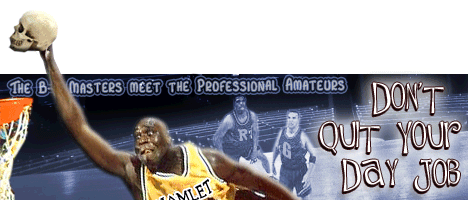 Destroyer (1988) -*½
Destroyer (1988) -*½
The B-Masters Cabal’s “Don’t Quit Your Day Job” roundtable, celebrating (if you can call it that) the acting “careers” of people famous for doing things other than acting, was my idea. I say that not to brag, but to emphasize that there is something seriously wrong with me. You see, I pitched this project to my colleagues precisely in order to give myself an excuse to review Destroyer. Now there is no form of badness quite like that of a third-string late-80’s slasher movie, especially one made by people who mistakenly believe they’re funny. And what’s more, I had already seen Destroyer, so I knew full well how awful it was. Yet somehow I still found myself thinking one day, “Hey, you know what I’d like to see again? That shitty thing set in the prison, with the washed-up football player as the psycho with the jackhammer.” And having received that transmission from the Imp of the Perverse, I naturally had to share it with the rest of the Cabal. Because there’s something seriously wrong with them, too.
The aforementioned washed-up football player is Lyle Alzado, steroid-monster defensive lineman for the Los Angeles Raiders. Amazingly, Destroyer was not Alzado’s only film. After several years’ worth of walk-ons in pictures that needed a steroid monster to be seen in the background somewhere, he graduated to the status of poor man’s Kane Hodder, playing heavies ranging from the coach in Zapped Again! to the Murdoch-Bennett figure in Shocktroop. He was no damn good, and the looming obsolescence of weightlifters with machine guns meant that he probably wouldn’t have lasted much past his turn in 1991’s Neon City in any case, but I feel like kind of a jerk ragging on him, because it wasn’t paucity of talent that ended his film career. Rather, Alzado died at the horrifyingly young age of 43, from a brain tumor that he believed was a side effect of his longtime use of performance-enhancing drugs. I’ll give him this much, at least, as an actor: he’s the only person in the cast of Destroyer who appears to be having some fun with the project.
Alzado plays Ivan Moser (whom about half of the performers consistently call Ivan Mozier instead), serial rape-murderer. Moser racked up 23 kills before he was apprehended, including the Vanna White-like hostess of a “Wheel of Fortune”-like game show. Eighteen months ago, his execution by electric chair provided the catalyst for the deadliest prison riot in American history, unleashing such destruction that the building had to be closed down and condemned once order was restored. Now that shuttered prison is being partially reconditioned for use as the main shooting location for Death House Dolls, a women’s prison movie very loosely based on events surrounding the riot. That’s proving controversial for reasons above and beyond the obvious, for screenwriter David Harris (Clayton Rohner, from April Fool’s Day and I, Madman) has been doing background research that makes the local law enforcement types very uncomfortable. Most uncomfortable of all is Warden Karsh (Pat Mahoney, of Strangeland and Endangered Species), who was in charge of the place during the incident. When Harris tells a reporter from the TV news that he believes the systematic brutality of Karsh’s regime to have been the real cause of the riot, the warden starts threatening to shut down the production by getting the necessary permits rescinded.
Director Bobby Edwards (Anthony Perkins, from The Trial and The Black Hole) has enough worries without bleeding-heart screenwriters getting him into trouble with the Department of Corrections. He’s behind schedule, apparently working without a finished script, and his star, Sharon Fox (Kiss and Be Killed’s Lannie Garrett), is an arrogant prima donna whose temper tantrums are in no way earned by her abilities in front of the camera. His top special effects guy, known only as Rewire (Jim Turner, of The Lost Boys and Programmed to Kill, whom I know mainly from the countless surreal station identification spots he appeared in for MTV), is stoned all the time. And Russell (Harvest of Fear’s Tobias Anderson), the minder with whom Edwards has been saddled by the prison authorities, gives everybody in the whole cast and crew the willies. Seemingly the only person who is never a pain in Bobby’s ass is Susan Malone (Deborah Foreman, from Waxwork and Sundown: The Vampire in Retreat), Sharon Fox’s stunt double, who happens also to be David’s girlfriend.
Of course, we all know that Death House Dolls is a doomed shoot, and that the agent of its doom is named Ivan Moser, executed or not. Evidently Moser was tougher than the chair, and he’s been living in the condemned prison the whole last year and a half. I guess no one noticed because he was assumed to be one of the 1400 dead hauled out of the place by the cops who put down the riot. Russell knows about Moser, though, and has apparently been helping him hide all this time in the hope of using him to get back at Warden Karsh. The nature of Russell’s relationship to the killer and grudge against the warden won’t come out until the third act, when Harris semi-unwittingly pries the secret out of a diner cook called Fingers (David Kristin), who used to be the prison executioner, and who threw the switch on Moser himself. In the meantime, Karsh sets himself up to be the first victim when he comes barging into the prison to protest Harris’s shit-stirring, and to threaten Edwards with the revocation of his permits. Interestingly, it appears to be Russell himself, and not Moser, who ambushes the warden on the toilet and burns him to a crisp with a blowtorch. Ivan is plainly the culprit behind the rest of the murders, though, jackhammering, slashing, and garroting his way through the cast and crew of Death House Dolls until only Susan remains. David happens to be away from the prison when Moser launches his second killing spree, leaving him in a position to mount a rescue once Fingers tells him enough to indicate that such a thing is in order. Of course, this being a slasher movie, we probably shouldn’t expect David’s intervention to amount to much.
However far the four big franchises within the genre had slipped by 1988, it’s crap like Destroyer that really drives home the senescence of the slasher film in the second half of the decade. Saying that Destroyer merely goes through the motions would be an unwarranted compliment, because it frequently can’t be bothered to do even that. For instance, the only fully developed murder scenes are those of Warden Karsh and the patrolman who comes looking for him the next day. Destroyer has a fair enough body count, but all the other slayings occur off-camera, evidenced solely by the subsequent finding-the-bodies sequence. The galling thing is that there’s actually the kernel of a good idea in the way this movie handles the bulk of the killing. The screams and commotion that attend Moser’s mass slaughter of Malone’s coworkers is faintly audible in the background as she goes in search of a forgotten prop; she doesn’t understand what she’s just barely hearing, but we sure do. Unfortunately, instead of springing that trick on us as the climax to the traditional winnowing of the cast, the filmmakers use it to cheat the audience out of what they’ve really come to see. Moser’s modus operandi is disappointing, too. Destroyer’s advertising campaign heavily played up the second murder, in which Ivan goes all Leatherface on the snooping cop with a jackhammer that has no reason to be there. We’re encouraged to think of that memorable but unlikely weapon as the killer’s trademark (this was the era when any self-respecting slasher had one of those), but in fact we never see it again. Beyond that, Moser winds up being one of the least frightening movie maniacs of his day, despite his immense bulk, horrid rap sheet, and apparent invulnerability to electricity. Director Robert Kirk doesn’t know how to frame Alzado to exploit his size, for one thing, and the perfunctory treatment of the murders makes it hard to see them as any big deal. Alzado, meanwhile, is wholly incapable of living up to the several writers’ attempts to make Moser a monster with personality. His quips fall flat, his leers overshoot creepiness into self-parody, and his efforts to intimidate collapse into a ludicrous display of flaring nostrils and bulging eyeballs. Nor does it help that the writers seem to have no clear idea why Moser survived the electric chair, or what his survival is supposed to signify.
Even so, Destroyer commits its worst blunders while trying to be funny. You know how it was in 1988— every horror movie wanted to be Evil Dead II, but so few of them came anywhere near success. In this one, the intended humorous meta-commentary of a crappy exploitation movie about the making of a crappy exploitation movie quickly devolves into the sad spectacle of several dozen tongues hunting in vain for a cheek. Consider Rewire. Jim Turner’s performance is functionally indistinguishable from his MTV-based Randee of the Redwoods persona, right down to the odd-looking sunglasses, only there’s no apparent reason why. Similarly, the back-story detail about the game show hostess seems to be a stillborn gag on the tempest-in-a-teapot scandal that erupted when Vanna White posed for Playboy in 1987, but it just sits there inertly waiting for a laugh that it makes no effort to earn. It’s the “Family Guy” approach to humor eleven years before “Family Guy:” “You remember that thing that happened that time? So do we! HAHAHAHAHAHAHAHAHAHA!!!!” It was no funnier then than it is today. Destroyer is on somewhat firmer ground with the interaction between Bobby Edwards and Sharon Fox, but the jokes on that front are soured in two distinct ways. On Bobby’s end, Anthony Perkins’s exasperation and embarrassment feel a little too real for comfort. And on Sharon’s, we face a bad actress playing a worse one, with results that beggar description.
This review is part of “Don’t Quit Your Day Job,” the B-Masters Cabal’s... well, maybe “tribute” isn’t quite the right word... to those who aren’t content with just one form of stardom. Click the link below to read my colleagues’ thoughts on the athletes, musicians, escape artists, and so forth who cast their gaze toward Hollywood, and say, “Shit, I can do that!”
Home Alphabetical Index Chronological Index Contact


